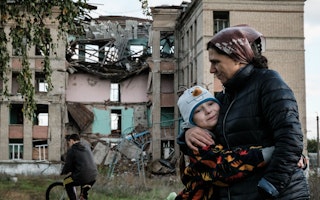Disabled People Have a Right to Live in the Community
By Judith Klein
The following article originally appeared in EU Observer.
On Monday, December 3, the international community recognized International Day of Persons with Disabilities. An estimated 1.2 million people with disabilities in Europe continue to languish in long-stay institutions. Institutionalization is widely recognized as a systematic and egregious violation of human rights.
Today, EU Structural Funds, intended to foster social inclusion and egalitarian regional development, are being spent on exactly the opposite.
Several Central and Eastern European countries like Bulgaria, Hungary, Romania, and Slovakia have invested tens of millions of euros in structural funds to build and/or renovate long-stay institutions for people with disabilities instead of supporting community-based alternatives, which safeguard human rights and are more cost-effective.
In Romania, it is estimated that €29 million in Structural Funds allocated for 2007-2013 was spent on expanding or renovating 39 existing institutions. In Slovakia, there is evidence that between 2008 and 2010, more than €185 million in Structural Funds were invested in renovating or constructing 130 institutions, all of which had over 50 residents.
The Bulgarian government decided to invest Structural Funds in the construction of 149 congregate settings for 14 children each. In Hungary, the current call for Structural Funds proposals allows for the option to build institutions for up to 50 people, and there is a chance that such new institutions will be built beginning in 2013.
People in institutions are disempowered, isolated, and denied basic rights like education, employment and the right to live in the community as equal citizens. Lack of heating, malnutrition, inadequate clothing, unhygienic sanitation, abuse and exploitation, and little or no rehabilitative or therapeutic activities are just some of the problems reported in institutions.
The EU must address this unjustifiable misuse of the Structural Funds. It is a breach of EU law and amounts to indirect discrimination. The EU and Member States when implementing EU law (which includes the use of Structural Funds) are under a legal obligation to ensure that standards are met under the Charter of Fundamental Rights, the UN Convention of the Rights of Persons with Disabilities (CRPD), and the European Convention on Human Rights.
Specifically the EU must safeguard: the right to liberty or freedom from arbitrary detention, the right to freedom from inhuman or degrading treatment or punishment; the right to private and family life; the right to live independently; and the prohibition of discrimination on grounds of disability.
Community living means that people with disabilities can live and participate in the community as equal citizens with equal rights and opportunities, and focuses on individualized care, choice, and access to services.
Vibrant examples of inclusive communities are being developed in several Central and Eastern European countries by organizations that promote supported living and employment, inclusive education, and home-based services. What has been lacking until now is the financial backing to replicate these efforts at the national level.
Unless the EU explicitly demands that recipient countries invest Structural Funds in community-based services for people with disabilities, we will not see the shift to community-based models and appropriate supports and services for people with disabilities.
It is clear that the EU, as the donor of Structural Funds, has a responsibility to ensure that Member State recipients of the funds promote social inclusion.
The Norwegian Nobel Committee recently bestowed the Nobel Peace Prize upon the EU for what it believes is its most significant achievement: “the successful struggle for peace and reconciliation and for democracy and human rights.”
The prize should serve as a reminder to its recipient that it has a responsibility to promote basic rights for all of its citizens. That includes ensuring that its Cohesion Policy for 2014-2020 incorporates rigorous measures to ensure that Structural Funds are invested in promoting the right of people with disabilities to live in the community. They are European citizens, after all.
Until March 2019, Judith Klein was a senior adviser to the Open Society Public Health Program.


